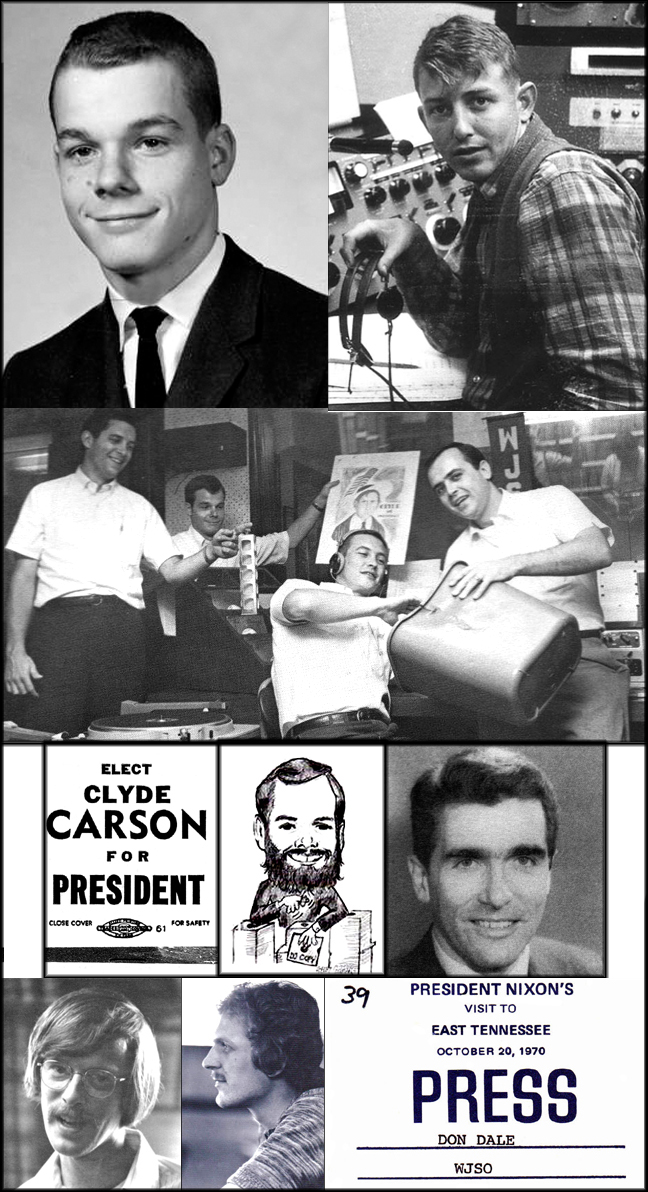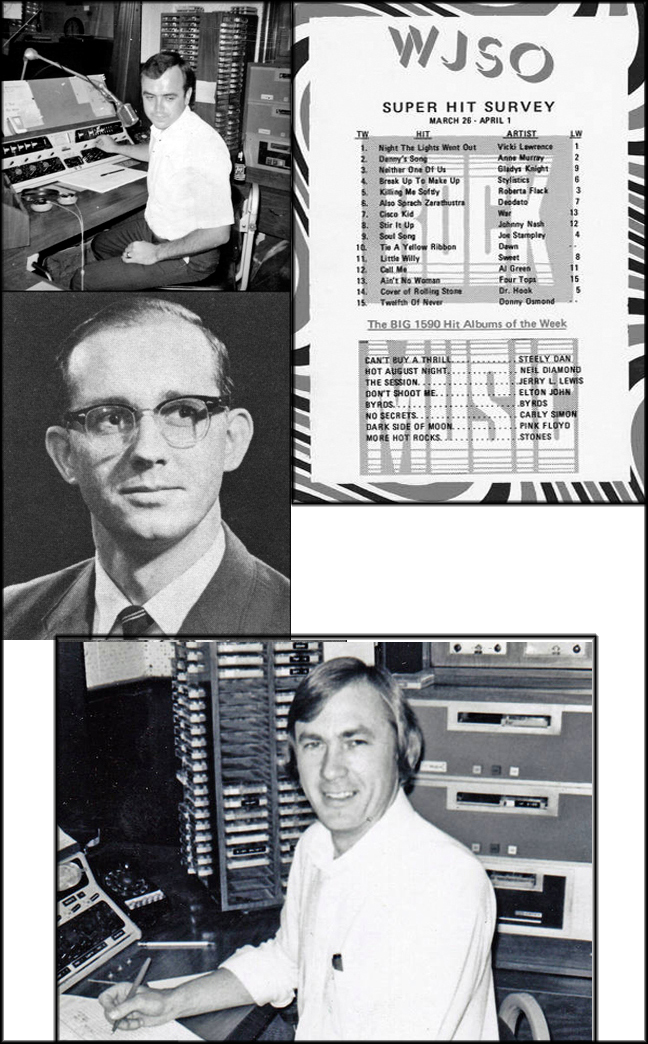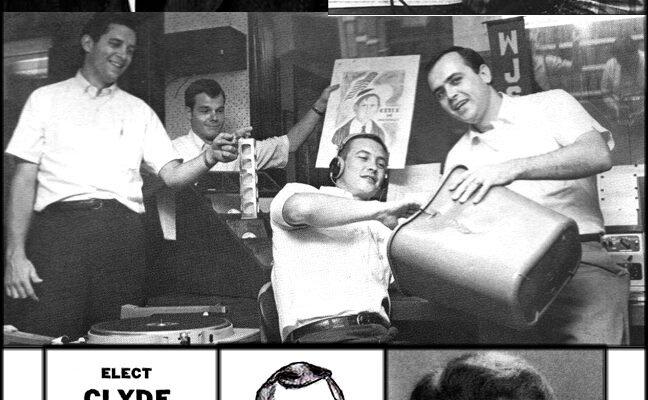Don Dale has a stack of memories from his working days at WJSO-AM where he once worked as program director:
“‘Jayso’ (as it became known), came along at the right time in the right place. When it first hit the airways in October 1958, it filled a niche as the first all rock and roll (Top 40) station in the Johnson City-Jonesborough area.”
The new station, located at Huffine Road in west Johnson City, attracted listeners almost overnight. Don said he wanted to be a part of it but realized he would have to wait until after graduation in 1961 before his aspirations would be realized.

(Top to bottom, left to right: Don Dale; Hugh Metheny; Ray Stockard, Don Dale, Jackie London, Randy Jackson; Clyde Carson Ad; Don Dale Caricature; Eddie Carter; Al Lefevere; Fred Story; President Nixon comes to E.T.)
According to the former deejay: “When I started at ETSC (now ETSU) in the fall of 1961, I immediately began working at the school’s WETS station where I shared a shift with fellow student Johnny Wood, now the legendary television personality at WCYB-TV in Bristol. In December, WJSO’s program director, Ray Stockard, offered me a part-time job at the station. Thus began a career that continued until 1980.”
Norman Thomas Sr. of Chattanooga owned and operated Mountain View Broadcasting Corp.; his son, Norman Jr., served as general manager. Some of the early personalities from that era included Norm Davis; Hugh Martin (a.k.a. Hugh Metheny); Bill Harris; Don Sluder; and Bob Mattox, who also supplied the voice of the “Old-timer” in the mornings.
Don explained that being a deejay was not easy. It meant pulling daily and often weekend shifts, spending off-air time doing twice-hourly newscasts, simultaneously working a production shift where they recorded spots (commercials), dubbing agency spots and producing station promos.
Computers were far into the future. Music was aired directly from records, which became scratchy after multiple plays. They had to be cued on turntables before playing them. The vast majority of commercials were dubbed onto special tape cartridges, or “carts” as they were called. The use of reel-to-reel recorders for ads was infrequent. Eventually, new records were copied onto tape cartridges when their sound quality was improved.
Dale served as program director from 1966-1980, the longest period in the station’s tenure. He worked with some great newcomers, broadcasting veterans and others who became successful in their careers. Eddie Carter (who also used the air name Danny King) went on to be news anchor at WJHL-TV in the 1960s and later had a long career at stations in Charleston and Columbia, South Carolina. John Paul Jones also moved on to WJHL as news anchor and later had a successful profession in North Carolina.
Red Kirk came to WJSO as a broadcast veteran, bringing with him an equally impressive career in country music, both as a writer and performer. He later became spokesman for local car dealerships, most notably Sherwood Chevrolet. Jeri George, who has been one of WQUT’s most popular personalities for decades, got her start at WJSO. Bob Honeycutt, who adopted the air name Bob Gordon at WJSO when he broke into radio, was operations manager at WKOS-FM until 2008.

Top to bottom, right to left: Randy Jackson, WJSO Super Hit Survey, Norm Davis, Wayne Sparks.)
Al Lefevere signed on at “Jayso” as a deejay, eventually becoming station engineer and then chief engineer for the group stations of WQUT, WJCW and WKOS. Other familiar deejays from that period were Fred Story, Steve Castle, Charlie Knox, Jack London, Wayne Sparks and Gary Nelson.
Don shared some humorous anecdotes that occurred at the station over the years: “Wayne Sparks’ was working the morning show when he became locked in the bathroom while being the only one in the building. After about 20 minutes, he managed to pry his way out with a spoon. He rushed back to his show, where a record had long been clicking unheeded in the final groove on the turntable.
“In my early years, I worked the Sunday morning shift, which consisted of blocks of local religious programming. One minister, who was always accompanied by several members of his congregation, typically started preaching slowly but accelerated to a frenzy as his sermon progressed. Once he accidentally kicked his microphone cord out of the wall socket. I rushed from the control room to replace the cord, but not before throwing the first record I could find on the turntable to fill the void. Unfortunately, I chose an instrumental by David Rose called “The Stripper.”
“Another incident involved Hugh Martin slipping into the news booth while Red Kirk was doing a newscast and setting his long sheet of Associated Press news copy on fire. The unflappable Red coolly doused the fire without missing a beat.”
Don recalled a second prank involving Hugh. “Jayso” had an echo chamber in a back room to give the deejays' voices a distinctive echo effect. It consisted of a wooden frame covered by insulation with a microphone inside at one end and a speaker at the other that was wired to the control room console. The apparatus was later upgraded to an electronic reverberation unit. One morning, Don signed on the station and was giving the news unaware that Hugh had come in early, hid his car from sight and climbed into the echo chamber. While Don was doing the first newscast of the morning, he was stunned to hear a silly voice making comments in the background. After several minutes, Hugh came out of the chamber displaying his usual infectious, raucous laugh.
In 1968, the former program director ran a fictitious country bumpkin, known as Clyde Carson, for president, complete with campaign slogans and trinkets. The conjured-up character, played by deejay Randy Jackson, recorded nonsensical “campaign ads” that included his platform plank to “abolish wheat germ.”
On a serious note, Don recalled the major event that occurred in November 1963 while he was doing his midday show. Charlie Knox, who worked the wire room, ran in to announce that President Kennedy had just been shot. Don immediately put him on the air. Ironically, he remembered that the record “Last Date” by Floyd Cramer was playing on the turntable.
Other interesting events that transpired over the years were chaperoning a contest-winning Little League Baseball team on an all-night bus ride to Yankee Stadium to see the Yankees and Dodgers in the World Series; sponsoring the March of Dimes Superwalk in 1978; covering visits by President Nixon in 1970 and President Ford in 1976; and interviewing Peter, Paul and Mary, KISS, Brenda Lee, and listening to John McEwen of the Nitty Gritty Dirt Band play several tunes on his banjo at the station.
Don concluded by saying, “Working at WJSO for 19 years was a unique and interesting experience. I am grateful to Norman Thomas and Ray Stockard for providing me that opportunity.”
